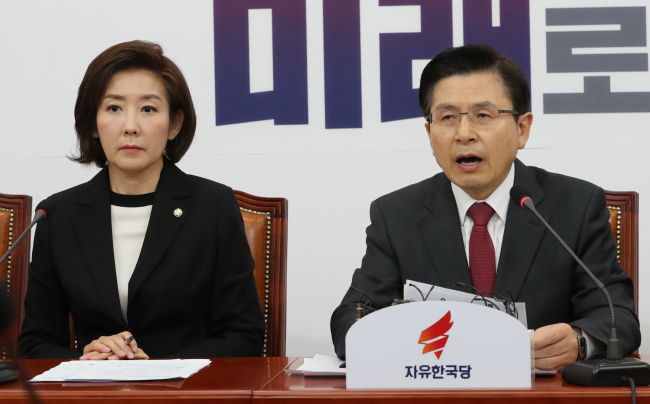[News Focus] Parties wage familiar war over appointments
By Choi He-sukPublished : April 8, 2019 - 17:46
An extraordinary session of the National Assembly began Monday, but the latest feud between the two main rival parties appears likely to bog down the business of the legislature.
On Monday, President Moon Jae-in appointed Rep. Park Young-sun as the new minister of SMEs and startups, and scholar Kim Yeon-chul as the new unification minister.
On Monday, President Moon Jae-in appointed Rep. Park Young-sun as the new minister of SMEs and startups, and scholar Kim Yeon-chul as the new unification minister.

The main opposition Liberty Korea Party had concentrated its vitriol on the two nominees during their confirmation hearings, and has repeatedly called on the president to reconsider.
Now that the president has moved ahead with the decision, the main opposition is warning that he will face determined resistance.
“Forging ahead with the appointment is (the Moon administration) admitting that it is an administration of self-righteousness and arrogance that believes that public sentiment and disapproval from the opposition party can be ignored,” Liberty Korea Party chief Hwang Kyo-ahn said Monday, vowing the party would fight until the end.
Hwang called on the president to penalize and replace all Cheong Wa Dae officials responsible for vetting candidates for public office. The former prime minister also called on his own party to work on revising related regulations to prevent the president from appointing anyone unless the parliament adopts the nominee’s confirmation hearing report.
Under the current regulations, those nominated to minister-level posts are required to undergo parliamentary confirmation hearings, but a president has the right to make appointments without parliamentary approval.
Liberty Korea Party Floor Leader Na Kyung-won went a step further, saying that by appointing Kim and Park the president was looking out only for his own and “abandoning the country and the people.”
The ruling Democratic Party, for its part, defends Kim and Park and has threatened legal action, accusing critics of defaming the two new ministers by spreading false information.
“The character attacks against the nominees have crossed the line,” Democratic Party Floor Leader Hong Young-pyo said, adding that his party would take legal action against the Liberty Korea Party.
“(The opposition) must not hamper the president’s exercise of his rightful power of appointment any further,” Hong said.
While Hong is correct to say the president has the right to appoint nominees, his words have a familiar ring -- perfectly echoing those of the main opposition party when it held power.
The main opposition’s accusations concerning Moon’s personnel decisions do not stand up to scrutiny either.
While the Liberty Korea Party accuses Moon of making catastrophic personnel decisions and of steamrolling over the National Assembly in an unprecedented manner, the truth is that former presidents Lee Myung-bak and Park Geun-hye both took similar actions.
Each of the two conservative administrations saw 11 individuals win nominations to ministerial positions -- including that of prime minister -- but either drop out voluntarily or have their nominations withdrawn.
In comparison, the same is true of eight nominees for positions requiring parliamentary confirmation hearings so far in the Moon Jae-in administration.
In addition, the number of nominees appointed without the National Assembly adopting a confirmation report is comparable under all three administrations.
The number of such appointments was 17 under Lee Myung-bak and 10 under Park Geun-hye.
With the addition of the new SME and unification ministers, 13 minister-level posts have been filled without the parliament’s approval so far in the current administration.
Despite the questions this practice raises, the presidential office typically offers little in the way of explanation.
The current administration is no exception, and statements on the matter from those closest to the president essentially boil down to counteraccusations against past administrations.
“There hasn’t been a single case of a president not appointing an individual whose confirmation hearing report was not adopted,” Noh Young-min, Moon’s chief of staff, said at the National Assembly on Thursday.
“It means that a confirmation hearing report has not been adopted. How can that mean that (the parliament) disagrees (with an appointment)? It is the National Assembly failing to carry out its functions.”
By Choi He-suk (cheesuk@heraldcorp.com)







![[Graphic News] More Koreans say they plan long-distance trips this year](http://res.heraldm.com/phpwas/restmb_idxmake.php?idx=644&simg=/content/image/2024/04/17/20240417050828_0.gif&u=)
![[KH Explains] Hyundai's full hybrid edge to pay off amid slow transition to pure EVs](http://res.heraldm.com/phpwas/restmb_idxmake.php?idx=644&simg=/content/image/2024/04/18/20240418050645_0.jpg&u=20240419100350)








![[KH Explains] Hyundai's full hybrid edge to pay off amid slow transition to pure EVs](http://res.heraldm.com/phpwas/restmb_idxmake.php?idx=652&simg=/content/image/2024/04/18/20240418050645_0.jpg&u=20240419100350)

![[Today’s K-pop] Illit drops debut single remix](http://res.heraldm.com/phpwas/restmb_idxmake.php?idx=642&simg=/content/image/2024/04/19/20240419050612_0.jpg&u=)